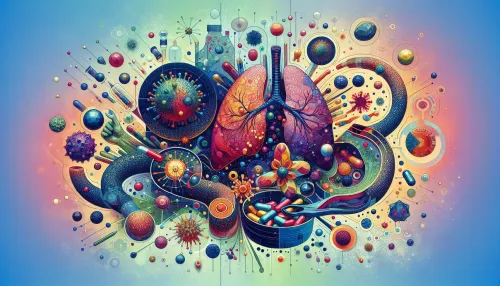The Gut-Brain Connection: Unveiling the Impact of Gut Microbiota on Mental Health

The relationship between gut health and mental well-being has garnered significant attention in recent years. This intriguing connection, often referred to as the "gut-brain axis," sheds light on the intricate interplay between the gut microbiota and mental health. Understanding this relationship can provide valuable insights into novel therapeutic interventions for mental health issues. In this article, we delve into the profound influence of gut microbiota on mood, stress responses, cognitive function, and its implications for psychological resilience and mental health treatments.
The gut, often termed the "second brain," houses a diverse community of microorganisms known as the gut microbiota. These microorganisms play a pivotal role in maintaining the overall health of the digestive system. However, emerging research suggests that the influence of gut microbiota extends far beyond digestion, exerting a substantial impact on mental well-being.
Exploring the Gut-Brain Connection
Research has revealed that the gut microbiota communicates bidirectionally with the central nervous system through neural, hormonal, and immunological pathways. This cross-talk between the gut and the brain directly influences various aspects of mental health, including mood regulation, stress responses, and cognitive function.
The composition of gut microbiota has been associated with neurotransmitter production, including serotonin, commonly known as the "feel-good" neurotransmitter. Serotonin plays a crucial role in regulating mood and emotional responses. Notably, a substantial portion of serotonin is synthesized in the gut, highlighting the significance of gut microbiota in mood modulation.
How Gut Microbiota Affect Mental Health
Furthermore, gut microbiota contribute to the production of other neuroactive compounds that affect cognitive function and stress responses. The intricate interplay between gut microbiota and mental health is evident in studies linking gut dysbiosis (imbalances in gut microbial communities) to conditions such as anxiety disorders, depression, and neurodegenerative diseases.
Understanding the profound influence of gut microbiota on mental health has opened new avenues for innovative therapeutic interventions. Probiotics and prebiotics, known for their beneficial effects on gut microbiota composition, have shown promise in modulating mood and stress-related behavior.
Moreover, emerging research indicates that dietary modifications aimed at nurturing a healthy gut microbiome may offer potential benefits for individuals struggling with mental health issues. These findings hold significant implications for the development of complementary strategies to augment existing mental health treatments and enhance psychological resilience.
Related Article: The Science of Sleep: Optimizing Your Rest for Health and Vitality
Therapeutic Interventions for Mental Health
Probiotics, live microorganisms that confer health benefits when consumed in adequate amounts, have gained attention for their potential role in promoting psychological resilience. Several studies have reported positive associations between probiotic supplementation and improvements in mood parameters among individuals experiencing stress-related conditions.
Similarly, prebiotics indigestible fibers that serve as nourishment for beneficial gut bacteria have exhibited promising effects on mental well-being. By fostering a favorable environment for beneficial microbial populations within the gut, prebiotics contribute to an optimal balance of gut microbiota, potentially enhancing psychological resilience.
The Role of Probiotics and Prebiotics
The link between gut microbiota research and its relevance to anxiety, depression, and neurological disorders continues to unveil intriguing insights. Studies investigating the impact of gut dysbiosis on mental health disorders have provided compelling evidence supporting the role of gut microbiota as a potential target for therapeutic interventions.
Moreover, ongoing research focusing on the modulation of gut microbiota composition through dietary interventions and supplementation holds promise for novel approaches to managing mental health conditions. The emerging understanding of the gut-brain connection has opened new horizons for addressing psychiatric disorders through targeted interventions aimed at restoring gut microbial balance.
In conclusion, unraveling the intricate relationship between gut microbiota and mental health unveils a paradigm shift in our understanding of psychological well-being. The burgeoning field of research at the intersection of gastrointestinal health and mental wellness presents opportunities to revolutionize therapeutic approaches for anxiety, depression, and neurological disorders. As we continue to explore this captivating avenue of study, it is evident that nurturing a healthy gut environment holds promise for fostering resilient minds and promoting holistic well-being.
Frequently Asked Questions
The gut-brain connection, often referred to as the "gut-brain axis," is the intricate relationship between gut microbiota and mental health. It highlights how gut microorganisms communicate with the central nervous system, influencing mood, stress responses, and cognitive function, thereby affecting overall mental well-being.
Gut microbiota influence mood and stress responses by producing neurotransmitters like serotonin, which regulates emotional responses. Imbalances in gut microbiota, known as dysbiosis, have been linked to anxiety and depression, indicating that maintaining a healthy gut can positively impact mental health.
Yes, probiotics and prebiotics can improve mental health by enhancing gut microbiota composition. Probiotics are live microorganisms that promote psychological resilience, while prebiotics nourish beneficial bacteria in the gut. Together, they may help modulate mood and reduce stress-related behaviors.
Check Out These Related Articles

Microbiome Insights: Revolutionary Findings on Gut Health and Its Impact on Mental Well-Being

Gene Editing for Well-Being: The Promising Frontier of Epigenetic Medicine

Untangling the Confusion Around Supplements in Wellness Journeys
